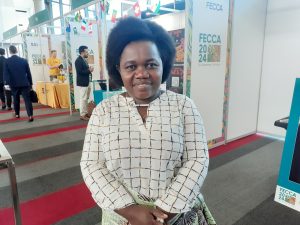Burundi first nations woman on a mission [FECCA]
Imelde Sabushimike is the first woman from Burundi’s ethnic minority Twa people to go to university and to become part of the government in her homeland.
Now Burundi’s Minister for National Solidarity, Social Affairs, Human Rights and Gender, Ms Sabsushimike shared her inspirational story at the recent Federation of Ethnic Communities Councils of Australia (FECCA) conference in Brisbane.
Once referred to by the pejorative term ‘Pygmies’, the Twa people have long faced discrimination and persecution and were the among the victims of the Rwandan war and genocide.
 But Ms Sabushimike is working to lift her people out of poverty and give them opportunities for education and employment.
But Ms Sabushimike is working to lift her people out of poverty and give them opportunities for education and employment.
“I am from one of the first nation peoples of Burundi. My people have traditionally lived in extreme poverty working mostly as potters. Our people made pots to exchange for small amounts of food,” she said.
“We had no hope for the future and no avenue for education. Then one day, my mother had the opportunity to integrate with the mainstream community in Burundi,” she said.
“When I was a child, the President made education free for first nations people. But was killed three months later and the policy ended.
“But my mother was resilient, and she sold pots to feed and sustain us, and I was able to complete my primary education.
“But my mother died before I began high school; my father had died when I was young. But fortunately, I was supported by a range of people in small ways, and I was able to keep going to school.
“These times were very hard for me. Sometimes I felt like I had malaria, but it was hunger.
“I begged for resilience from God, and I decided to work hard.
“Through my studies, I went back to my community to help them. I wanted to promote good hygiene and the benefits of education among them.
“I completed a university degree, and I again went back to help my community,” she said.
Ms Sabushimike was appointed a minister by Burundi’s current president General Evariste Ndayimiyishe.
“The president appointed me to this position to demonstrate the start of inclusive government and to demonstrate that people can achieve what they want,” she said.
“Today, I work hard to support other people like me to achieve their aspirations.”
Ms Sabushimike told the conference she felt empathy with Australia’s first nation peoples.
“I was supported by people on my journey and now my work is to support vulnerable communities,” she said.
“I am the only university educated person from my community, but I am trying to encourage more people to follow me,” Ms Shabushimike said.
She is using her own salary to establish a school for children from vulnerable communities.
“My work is personal to me because I understand what it is to live in poverty,” Ms Sabushimike said.
The Twa, who make up approximately one per cent of the Burundi population, historically lived as hunters and gatherers in the equatorial forests of Africa.
Their ancestral forests not only served as a means of survival, but they also played a central role in religious and cultural traditions.
About two decades ago, the Twa lost their native land. Without land, compensation or skills to live outside the forests, they have been struggling to survive in their new environment.
The drastic lifestyle changes have left the Twa in difficult circumstances.
“The new life was imposed on us without warning. We had no time to prepare to integrate into another life outside the forest,” Ms Sabushimike said.
A result of the changes was a dramatic decline in the Twa population, and many have become marginalised.
“We live in extreme poverty and progress towards integration has been slow”, Ms Sabushimike said.
“Over time we have been marginalised, oppressed and discriminated. We are perceived to be of inferior social status in Burundi because we do not own land. We have never possessed land or livestock, which is the principal method of earning a living in Burundi.
“But now we are fighting back against this,” she said.












